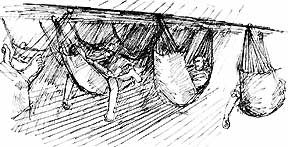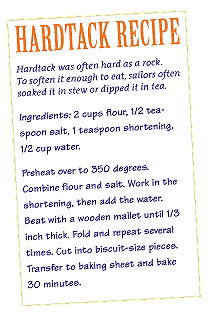
 |
 |

Sleeping?
Herman Melville, in White Jacket, tells the whole truth about hammocks.
Let me speak of my hammock and the tribulations I endured therefrom. Give me plenty of room to swing it in, and I would not exchange my coarse canvas hammock for the grand state-bed in which they tuck in a king. ...But when, with five hundred other hammocks, yours is crowded and jammed on all sides,
on a frigate berth deck, when “spreaders” are prohibited by an express edict from the captain’s cabin; and every man about you is jealously watchful of the rights and privileges of his own hammock, as settled by law and usage; then your hammock is your Bastille and canvas jug; into which, or out of which, it is very hard to get; and where sleep is but a mockery and a name.
Eighteen inches a man is all they allow you; eighteen inches in width; in that you must swing. Dreadful! they give you more swing than that at the gallows.
 One extremely warm night, during a calm, when it was so hot that only a skeleton could keep cool (from the free current of air through its bones) after being drenched in my own perspiration, I managed to wedge myself out of my hammock; and with what little strength I had left, lowered myself gently to the deck. Let me see now, thought I, whether my ingenuity cannot devise some method whereby I can have room to breathe and sleep at the same time. I have it. I will lower my hammock underneath all these others; and then — upon that separate and independent level, at least — I shall have the whole berth deck to myself. Accordingly, I lowered away my pallet to the desired point — about three inches from the floor — and crawled into it again.
One extremely warm night, during a calm, when it was so hot that only a skeleton could keep cool (from the free current of air through its bones) after being drenched in my own perspiration, I managed to wedge myself out of my hammock; and with what little strength I had left, lowered myself gently to the deck. Let me see now, thought I, whether my ingenuity cannot devise some method whereby I can have room to breathe and sleep at the same time. I have it. I will lower my hammock underneath all these others; and then — upon that separate and independent level, at least — I shall have the whole berth deck to myself. Accordingly, I lowered away my pallet to the desired point — about three inches from the floor — and crawled into it again.
But alas! this arrangement made such a sweeping semicircle of my hammock,
that, while my head and feet were at par, the small of my back was settling down indefinitely; I felt as if some gigantic archer had hold of me for a bow.
But there was another plan left. I triced up my hammock with all my strength,
so as to bring it wholly above the tiers of pallets around me. This done, by a last effort, I hoisted myself into it; but, alas, it was much worse than before. My luckless hammock was stiff and straight as a board; and there I was — laid out in
it with my nose against the ceiling, like a dead man’s against the lid of his coffin.
| Interpreting Signal Flags In addition to representing letters of the alphabet, International Alphabet Flags have other meanings, shown below. | |||
| Flag | Message | Flag | Message |
| B C D E F G | dangerous cargo yes keep clear altering course to starboard disabled want a pilot | N P Q | no |
|
To run the ship, stores were needed for six months of operation. Food, of course, was included, tons of it, since the crew consumed about 1.75 tons a day. Typically, Constitution left port carrying 10,000 pounds of bread, 48,500 gallons of water, and sizable quantities of such foodstuffs as butter, molasses, beans, potatoes and turnips. | |
|
|
|
A sailors’ joke was that barrels loaded onto ships were stamped: Unfit for human consumption, but good enough for sailors. Fresh food was scarce, unless the ship was in port or had just sailed. From Tyrone G. Martin’s A Most Fortunate Ship | Men of the sea were the first international society on earth, traveling to all its corners and carrying its riches to every part. It was these world travelers who brought new products and new words back to their home lands and enriched both lives and languages.
|
| Plum Duff |
|
 |

